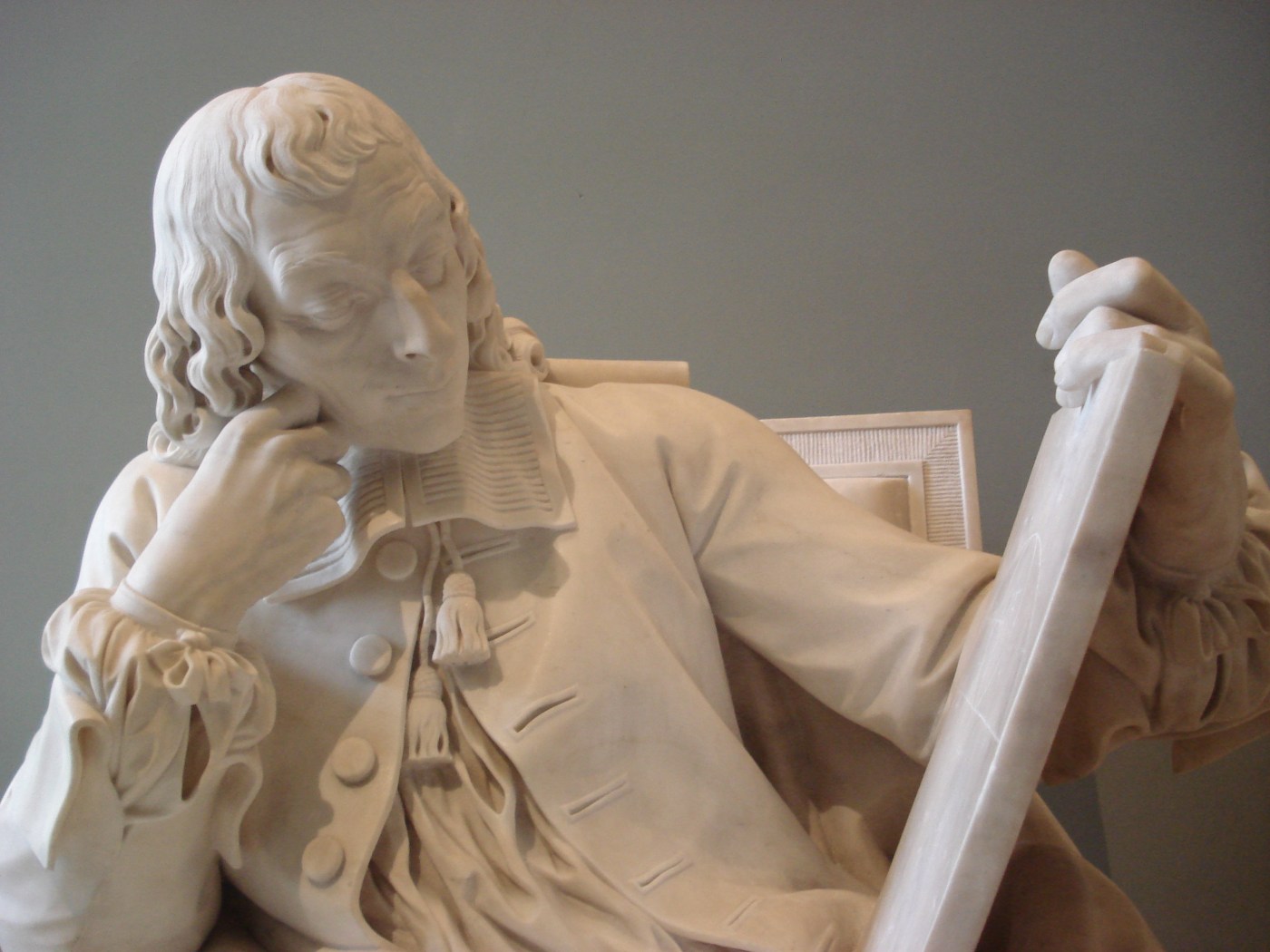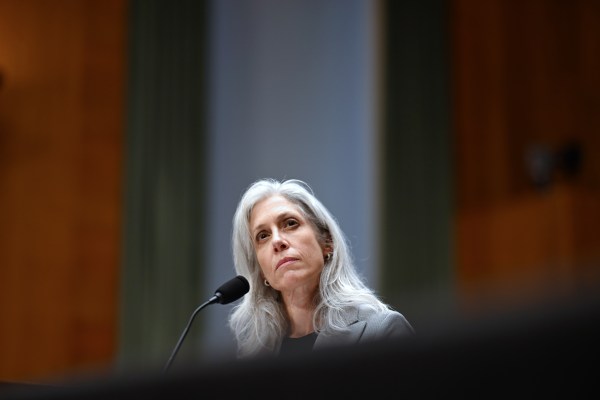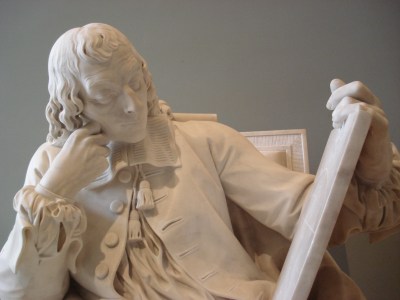This year’s Thanksgiving Day—November 23—was not only our national day of remembrance but a significant religious anniversary: 369 years to the day since Blaise Pascal’s “Night of Fire.” That deeply private, mystical experience transformed the great French polymath into one of the greatest Christian thinkers of modernity. Although we rarely mark such personal experiences as historic events, this one should be remembered. It produced not only a change in Pascal’s life but a new understanding of Christianity—one especially calculated to speak to modern souls.
According to Pascal’s account of that night, for two hours, after a day spent in prayer, he experienced a revelation. He wrote down what happened under the heading FIRE—like the fire that came to Moses on Mount Horeb. That fire acquainted him with the God of “Abraham, Isaac, and Jacob”—the patriarchs of Israel—“not of philosophers and scholars.”
This experience turned Pascal’s life upside down. He turned his attention from his pathbreaking scientific studies to writing his Provincial Letters and Pensées, in which he would reconceive for the modern world what Pierre Manent calls “the Christian proposition:” “the whole ensemble of Christian dogmas or mysteries” God in His Church proposes for “the consideration of our understanding and the assent of our will.” The Night of Fire was so important to Pascal that he kept his notes from it on a piece of paper sewn into his vest pocket. For the remaining seven years of his too-brief life, he would unstitch the pocket and re-stitch the notes into his new garment every time he donned a new vest.
The event is especially important to remember in our moment, when some Christians are questioning modernity, liberalism, and the ecumenical links that have been forged among believers of several faiths in recent decades. Remembering Pascal’s “night of fire” can help us once again understand, in religious terms, the importance of one of those links: the reconciliation the Catholic Church has sought with Jews since the Holocaust. Pascal’s conversion experience, with its distinctly Mosaic overtones, would eventually lead him to show that Christianity’s firmest foundation is the sanctity of Judaism, both past and present.
That night reoriented Pascal’s life by convincing his philosophically sophisticated, mathematically exacting mind to take seriously the scriptural revelation of a personal God—the God of Abraham, Isaac, and Jacob, not the god of René Descartes. This turn made clear to Pascal that the flesh-and-blood history of human beings and the God who calls them by name is the heart of biblical revelation, and prepared him to develop a distinct appreciation of the flesh-and-blood descendants of the patriarchs.
For Pascal, one great sign of Christianity’s holiness is that it has another holy religion for its foundation. The singularity and antiquity of Judaism among the religions of the world, its distinctive testimony to the strange and fraught relation between God and his people, and Israel’s continuing witness to a shared heritage of prophecy between Jews and Christians even as they disagree about its meaning, became for Pascal the sine qua non of Christian belief and understanding.
In a section of the Pensées that considers the “advantages of the Jews,” Pascal notes that the Jews are marked out from the beginning of history as an extraordinary people. Whereas most nations include an “infinite set of families,” Israel is uniquely composed “wholly of brothers,” descended from their common father, Abraham. Unlike many once-great nations that disappeared beneath the sands of history, this one has somehow survived for millennia despite repeated efforts to destroy it. This most ancient of peoples is called in the Bible to be a “light unto the nations.” Perhaps Pascal means to suggest that the Jewish people’s brotherhood contains a lesson in our common, human brotherhood applicable to all the sons of Adam and daughters of Eve.
Second, Pascal notes, this people possesses the most ancient law the world knows—a law the great ancient Jewish-Greek authors, Philo and Josephus, argued had been observed for a thousand years even before the word “law” appeared among the Greeks. That law is so unusually perfect that other lawgivers have borrowed from it whenever they have discovered it, as Josephus seeks to show. Human thought generally progresses through questioning and reformulation; it is therefore remarkable, Pascal argues, that the most ancient law is so excellent that everyone who encounters it feels duty-bound to respect and imitate it. One may observe this in America from the legal codes of the Puritans to the invocations of Moses and the 10 Commandments in the architecture of the Supreme Court.
Third, the severity of the details of the law makes its longevity among the Jewish people even more astonishing. The law imposes on its adherents “a thousand peculiar and painful observances,” Pascal writes, from circumcision to dietary restrictions. Yet while the more lenient laws of other states have often been changed, the “rebellious and impatient” Jewish people have borne this demanding yoke for centuries.
Fourth, the books the Jews preserve relate a history of Israel’s internal quarrels, its injustices, and its infidelities to God. As Pascal puts it, the Jews “carry with love and devotion this book in which Moses declares that they have been ungrateful toward God all their lives.” In other words, the Torah does not whitewash. The testimony of a people so willing to accuse itself is, Pascal implies, particularly trustworthy.
Finally, and perhaps most importantly, the Jews bear constant witness that human beings forsook direct, constant “communication with God” thousands of years ago, and have been living in “estrangement” from the divine ever since. Their experience shows that the alienation human beings experience in modernity is far from new. Though imperfect systems such as capitalism or limited intellectual frameworks such as modernity may warrant criticism, the alienation so common among us has much deeper roots. Indeed, it is at the heart of the most ancient description of the human condition: Since the expulsion from Eden, human beings have felt like “deposed kings,” as Pascal writes. Awareness of the gap between the perfect holiness and happiness we long for, and the flimsy substitutes we concoct, is the necessary condition of seeking our own redemption.
To be sure, while Pascal articulates a reverence for the Jews that stands out among Christian authors, he believes that the Messiah the Jews did not recognize, Jesus Christ, points the way to salvation. The Jewish refusal to recognize this is, at times for Pascal, all the more reason for Christians to cherish their testimony—for the testimony of witnesses who do not share one’s conclusions but nevertheless affirm one’s premises is the most credible kind of testimony. The Jewish Prophets of the Old Testament are, for Pascal, the greatest proofs of the New Testament.
At times, however, Pascal slides into a facile supersessionism, arguing that the prophets point toward a new covenant with Christ, meant to replace entirely the old covenant of Moses. As theologian Paul Griffiths points out in his recent book Why Read Pascal?, here Pascal is guilty of forgetting his own argument that the Jewish people “continue in being for a reason,” that their persistent presence is part of a divine plan.
The Catholic Church has affirmed the persistent validity of Jewish election in recent decades. Its 1965 declaration on the relation between the Church and Non-Christian Religions, Nostra Aetate, notes that, in Romans 11:28-29, the Apostle Paul teaches that “the Jews remain very dear to God, for the sake of the patriarchs, since God does not take back the gifts he bestowed or the choice he has made.” As Griffiths argues, “Catholic doctrine now requires it to be said that the covenant between the Lord and Israel remains in force, and will do so until the end of all things. That entails, among other things, that the halakhic lives of observant Jews are, still, a means of responding to the particular gift the Lord has given and continues to give to Israel.”
How can this be if the Jesus whom Jews reject as the Messiah they have been promised is indeed what he claims to be—neither liar nor lunatic, but Lord? Here, Pascal reminds us that grace (even presumably the grace of Christian revelation) is not “the last end” but “only a figure of glory,” which when it finally appears in its fullness will show how seemingly irreconcilable contradictions are woven into a many-colored but seamless garment of truth. We do not yet see that glory, or how it may reconcile the ancient conflict between Christian and Jew. But belief in the God of the Old Testament, who does not revoke His promises to the children of Abraham, and the God of the New Testament, who brings that promise to the Gentiles, encourages Catholics to believe that such a reconciliation shall come to pass.
Other apparently insurmountable historic divisions have already been superseded. Earlier this year Pope Francis, wrote a letter, “On the Greatness and Misery of Man,” to celebrate the 400th anniversary of Pascal’s birth. It’s remarkable because Francis is the church’s first Jesuit pope, and Pascal was the most incisive critic of the Jesuits of his time. No one familiar with the bitterness and violence of the Jesuit-Jansenist quarrels in which Pascal’s life was embroiled would have expected a Jesuit pope to become Pascal’s champion. The Lord works in mysterious ways.
At this moment when Jews are particularly in need of the solidarity of Christians, it is worth remembering that Christian respect for the Jewish people is not primarily a consequence of liberal toleration, but an implication of the Christian faith itself. Christianity requires belief in many paradoxical things, and one of the richest of these paradoxes is that two covenants, old and new, must coexist if what Christians believe about the God who keeps His promises is true. That is perhaps what Pascal began to understand on his “Night of Fire,” when he received his faith in Jesus Christ from the God of Abraham, Isaac, and Jacob.






Please note that we at The Dispatch hold ourselves, our work, and our commenters to a higher standard than other places on the internet. We welcome comments that foster genuine debate or discussion—including comments critical of us or our work—but responses that include ad hominem attacks on fellow Dispatch members or are intended to stoke fear and anger may be moderated.
With your membership, you only have the ability to comment on The Morning Dispatch articles. Consider upgrading to join the conversation everywhere.